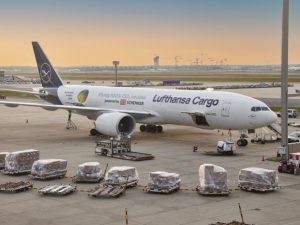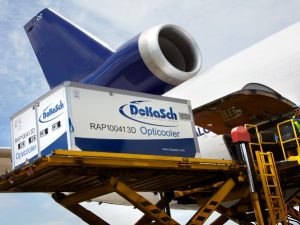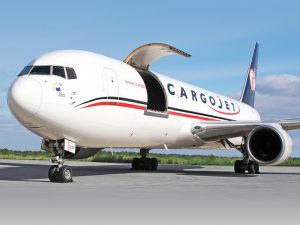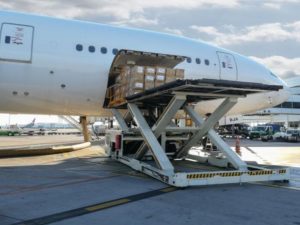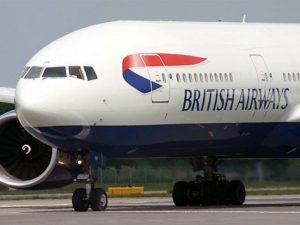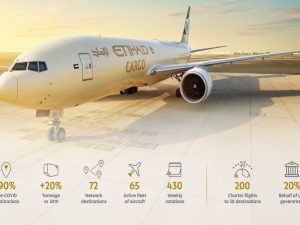Lufthansa Cargo, one of the world’s leading companies in the transport of air freight, has been making significant strides in the direction of embracing sustainability and digitalization – one innovation at a time. The German cargo carrier has been on an interesting path of forging a future built with sustainability goals in mind and has rolled out a number of decisions exhibiting this especially under the leadership of Dorothea von Boxberg, Chairperson of the Executive Board and CEO of Lufthansa Cargo who took charge this March. This also comes close on the heels of the air carrier having clocked an impressive year after its revenues reached historic highs, even as the global air cargo demand has reached above 2019 levels. Despite global air freight capacity crunch leading to a fall in sales, there was an improvement in its cargo load factor and yields were up in all regions served by Lufthansa Cargo.
Read More »Innovations safeguarding pharma cold chain
The pandemic has fast-tracked the need for innovation and the increased need for transformations in the healthcare sector, especially in the transportation, logistics and last mile delivery of the Covid-19 vaccine. As transportation of medicines and pharmaceuticals is increasing due to the delivery of the Covid-19 vaccine, container solution providers around the world who deliver and process temperature-controlled pharma products have been rising to the challenge posed by the pharma industry in several ways. In line with this, va-Q-tec – a German tech firm that sells products for temperature controlling and insulation-vacuum, insulation panels and phase change materials has signed a deal with Turkish Cargo to deploy its thermal container va-Q-tainer on the airline’s fleet. The container has a special low-temperature service free of dry ice down to -50°C, which is best suited for carrying and transporting the Covid-19 vaccines. va-Q-tainers can maintain various temperature ranges between -70 °C upto +25 °C for several days inside the container. In addition, the underlying production processes have been certified as climate-neutral, according to the UN Greenhouse Gas Protocol since 2020.
Read More »Cargojet continues international expansion with 21Air investment
Cargojet has invested in a minority share of US freighter operator 21Air as it looks to grow internationally. Cargojet will acquire a 25% interest in 21Air and will “continue to collaborate with 21Air on mutually beneficial opportunities in this expanding air cargo market”. 21Air is certified by the US Federal Aviation Administration (FAA) as a Part-121 air carrier presently operating a fleet of five Boeing 767 all-cargo aircraft. The company provides charter, ACMI, and CMI services to air cargo consolidators, freight forwarders, couriers, and integrators, including Cargojet. “This transaction is in line with Cargojet’s previously announced international growth strategy. This investment further demonstrates our ambition to build a more diversified and robust global footprint with strategic partnerships,” said Ajay Virmani, president and chief executive.
Read More »Celebi Launches Bonded trucking from Bengaluru and Chennai
Celebi Delhi Cargo Terminal Management India Pvt Ltd, in collaboration with their logistics business partner M/s Shreeji Translogistics Ltd , have commenced a dedicated bonded trucking from Bengaluru & Chennai to Celebi Delhi Cargo Terminal , IGI Airport after the successful launch at Hyderabad , Kanpur , Ludhiana , NOIDA SEZ , Pithampur SEZ1 & SEZ2 , Ahmedabad , Indore and Kolkata to provide their customers a possibility to move air cargo in an efficient , safe , process driven and cost effective manner. Bengaluru service was launched on 15th July 2021, while Chennai bonded service on 11th August 2021. Celebi Delhi Cargo Terminal as an organization, has always been focused on new initiatives in terms of facility development, equipment & machinery and process improvement. This also includes Bonded Road Feeder Services to connect Celebi terminal at Delhi Airport with several hinterland locations and manufacturing regions. Bonded trucking is relatively a new concept in India and Celebi Delhi Cargo Terminal has taken a step forward to start a Hub & Spoke project. These bonded trucking service will open tremendous opportunities to Airlines to solicit business from stations that are offline. Celebi’s Airline Customers can now offer services to a city to which they do not fly, meaning a geographic expansion of Airline territory . Chairman BAR (I) Cargo Committee – NR Vipul Bhalla reacted to the opening of these new Celebi bonded routes and said “ Thank you for opening up options for the North India market as well as for the increased choices for our customers spread across India. Your recent additions from Bengaluru and now Chennai are very welcome additions allowing our customers alternate routing via Delhi. We …
Read More »Tirupati Airport announces new domestic air cargo terminal
Tirupati Airport welcomed the opening of a new Domestic Air Cargo Terminal, which is aimed at providing a strong impetus to the exports of the region. The new facility will facilitate the export of perishables to any destination which will help the farmers in the region Tirupati. The newly set up Domestic Air Cargo Terminal (DACT) was formally inaugurated at Tirupati Airport by R Madhavan, Regional Executive Director, Airports Authority of India (AAI), Southern Region, Chennai on Thursday. Regional Manager D Muralidharan and Airport Director S Suresh were also present. Speaking on the occasion, Madhavan said that with the commencement of cargo operations, the economic activity in and around the region will improve and facilitate economic growth. With this, the outbound and inbound mail, cargo and air traffic at Tirupati Airport is expected to increase.
Read More »Virgin Atlantic Cargo and Delta Cargo extend dnata partnership
Virgin Atlantic Cargo and Delta Cargo have extended their long-standing partnership with dnata for five years, continuing the successful operation of ground handing and export services from the joint London Heathrow hub and Manchester Airport. The partnership also includes regional cargo gateways London Gatwick, Aberdeen, Birmingham, Edinburgh and Newcastle. dnata will continue to support the carriers’ cargo operations from its state-of-theart City East facilities at London Heathrow, boasting new technologies and award winning practices including: • 18 customer delivery doors with a Gatehouse concept • ETV (Elevated Transfer Vehicle), capable of full automation, with 245 pallet positions, up 20 percent, which enables the loading of flights in ‘trim order’ to support the airlines’ on-time performance • High-rise racking with 1,350 positions for storing export freight, eliminating unnecessary movements of shipments • A dedicated Pharma Zone and increased capacity for temperature controlled and perishables cargoes • Special facilities for Dangerous Goods and Live Animal shipment • X-ray technology with enhanced imaging capability, reducing the need for secondary cargo screening • Advanced internal and external high-definition CCTV systems to ensure a safe and secure working environment
Read More »Global Airlines tweak capacity levels to address flat demand during July
Global airlines managed the traditional summer slack season for air cargo space in July by constantly tweaking capacity levels to address flat demand during the month versus pre-Covid levels. New industry volume, loadfactor and rates data from analysts CLIVE Data Services and TAC Index also highlight airfreight rates lagging two weeks behind changes in the demand and supply ratio. As in previous months of 2021, to provide meaningful analyses of the current state of the global air cargo market, CLIVE continues to measure performance to pre-Covid 2019 levels as well as providing 2020 year-over-year comparisons. This shows chargeable weight was flat in July versus 2019 and up by 23 percent over 2020. Capacity, however, remains tightly constrained. Available capacity, up by 29 percent compared to 2020, is still down by 18 percent below the level seen in 2019 before the pandemic took hold. Consequently, CLIVE saw a fluctuating ‘dynamic loadfactor’ in July. Reduced capacity contributed to up by 5 percent pts rise in dynamic loadfactor versus 2019 – measured against both the volume and weight perspectives of cargo flown and capacity available – but down 3 percent pts drop over the same month in 2020.
Read More »IAG Cargo reaches 10 mn vaccine milestone with UNICEF and Crown Agents
IAG Cargo has transported over 10 million COVID vaccines, supporting global efforts in the fight against COVID-19. This includes a 4 million dose shipment to Abuja, Nigeria in collaboration with UNICEF and its COVAX initiative and 300,000 doses to Jamaica, donated by the UK government. The Abuja shipment, completed on behalf of UNICEF, departed London Heathrow in July on two British Airways B777-200. The 300,000 doses of COVID-19 vaccines bound for Jamaica also departed in July and were delivered in partnership with Crown Agents on a British Airways B777-200. Darren Peek, Head of Sales at IAG Cargo said, “We’re proud that with our sister airlines, British Airways, Iberia, and Aer Lingus, we continue to support countries across the world on the fight against COVID-19. Last year we delivered over 20,000 tonnes of PPE and today we have delivered over 10 million COVID-19 vaccines working with UNICEF and partners like Crown Agents. We will continue to work with a range of partners in the global response to COVID-19, supporting the efforts to ensure equal access to vaccines for all countries across the world.”
Read More »Etihad Cargo’s tonnage goes up by 20 percent
Etihad Cargo recently announced to have recorded a 20 percent of increase in tonnage as compared to the same period in 2019. In the past month, Etihad Airways introduced flights to Malaga, Mykonos, Santorini, Phuket and Vienna, providing additional belly-hold capacity between Europe and Asia. Charter operations and a cabin loading initiative saw the carrier modify its five Boeing 777 aircraft by removing seats to provide additional capacity on key routes such as Dhaka and Ho Chi Minh City have enabled the Abu Dhabi-based carrier to service increased Asian demand. “Record loads have recently been achieved on a number of Asian flights, including more than 58,000 kg from Dhaka and 52,000 kg from Ho Chi Minh,” explained Martin Drew, senior vice president Sales and Cargo, Etihad Aviation Group. “These loads, with increased capacity enabled by cabin loading, were bound for Middle Eastern and European destinations via Etihad Cargo’s Abu Dhabi hub – a clear demonstration of the carrier’s determination to continue facilitating a global trade recovery.”
Read More »Volga-Dnepr concerned for aircraft fuselage degradation
Volga-Dnepr delegation held a meeting with Airbus’s top management about the launch programme for A350 freighter conversion, as a wide-body cargo aircraft solution, hosted on board Airbus’s A350-1000 on July 22, 2021, during the MAKS 2021 international aviation and space salon held in Russia. There are, however, concerns emerging about the widebody aircraft as Qatar Airways grounded thirteen A350s citing fuselage degradation. The delegation, headed by the chairman of the board of directors Aleksey Ivanovich Isaikin met Airbus executive president for the European Region Wouter Van Wesche. The all-cargo carrier that specialises in large air freight shipments, along with its subsidiaries, never had any Airbus aircraft in its freighter fleet that includes Antonov, Ilyushin and Boeing aircraft. The group’s interest in the new A350 production freighter, along with their curiosity to be the launch customer for the MC-21-300 freighter version, could be a serious attempt to diversify fleets to offer customised solutions to customers around the world.
Read More » Cargo Breaking News
Cargo Breaking News
